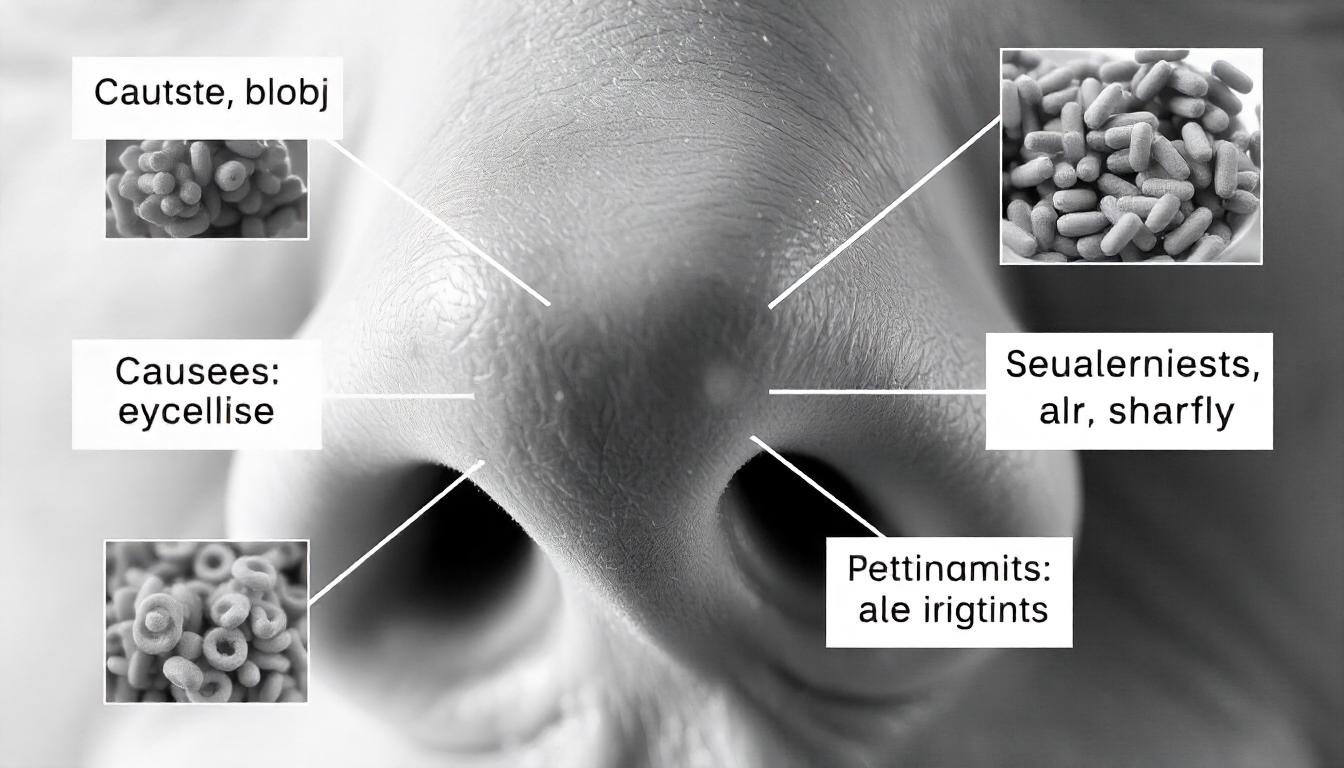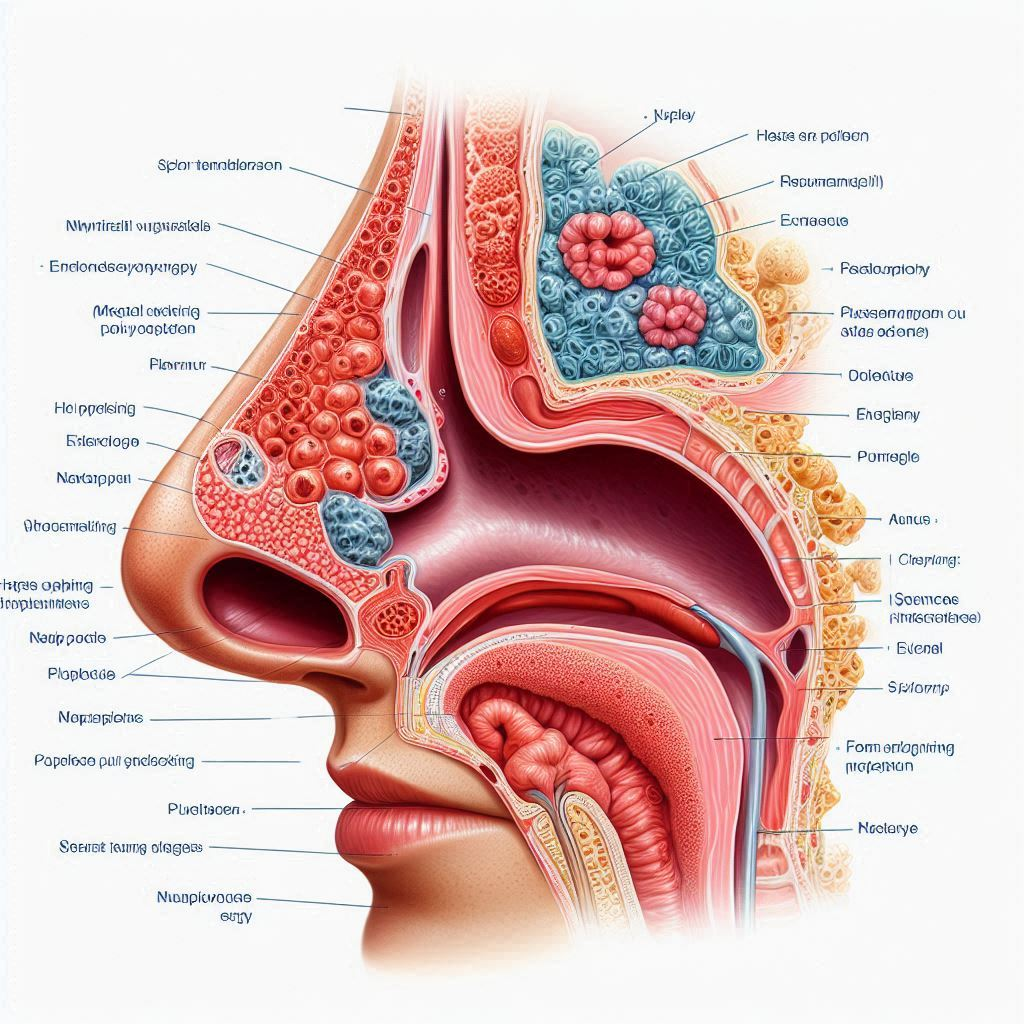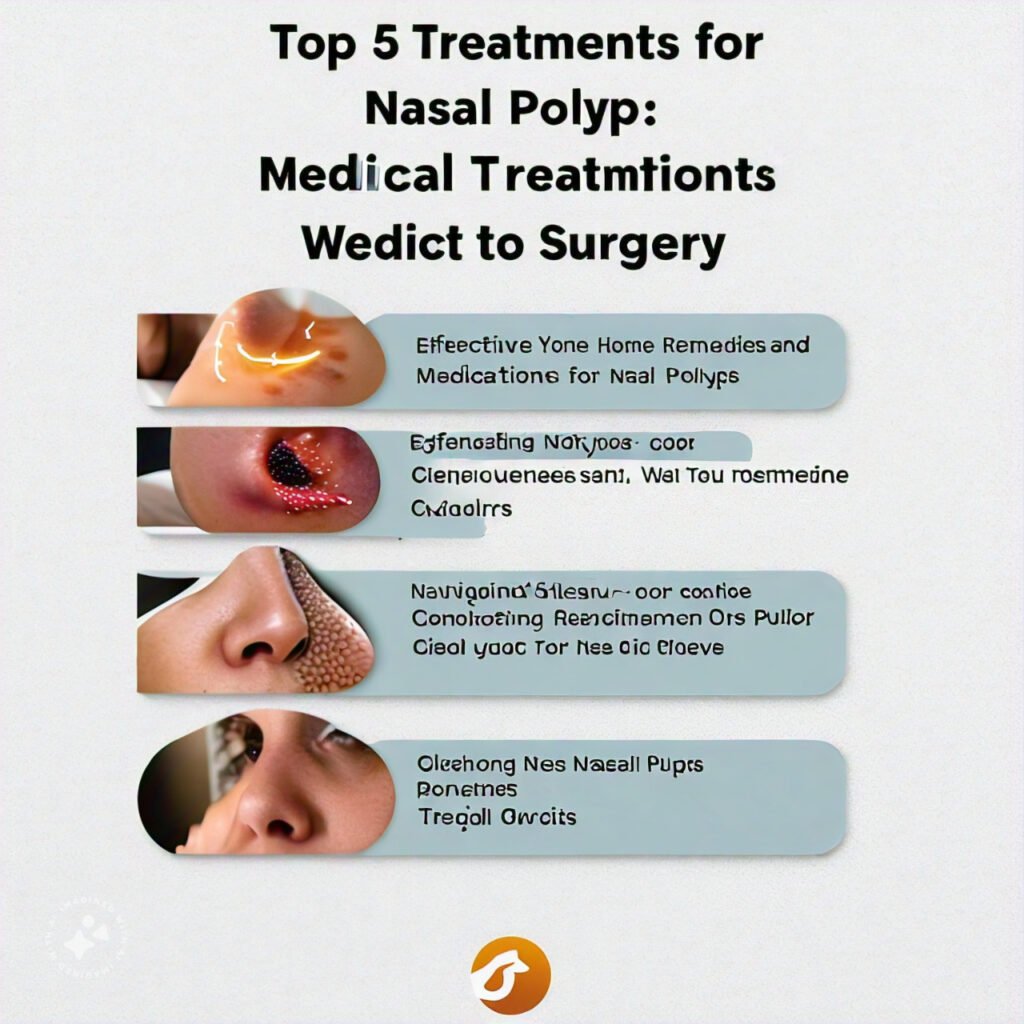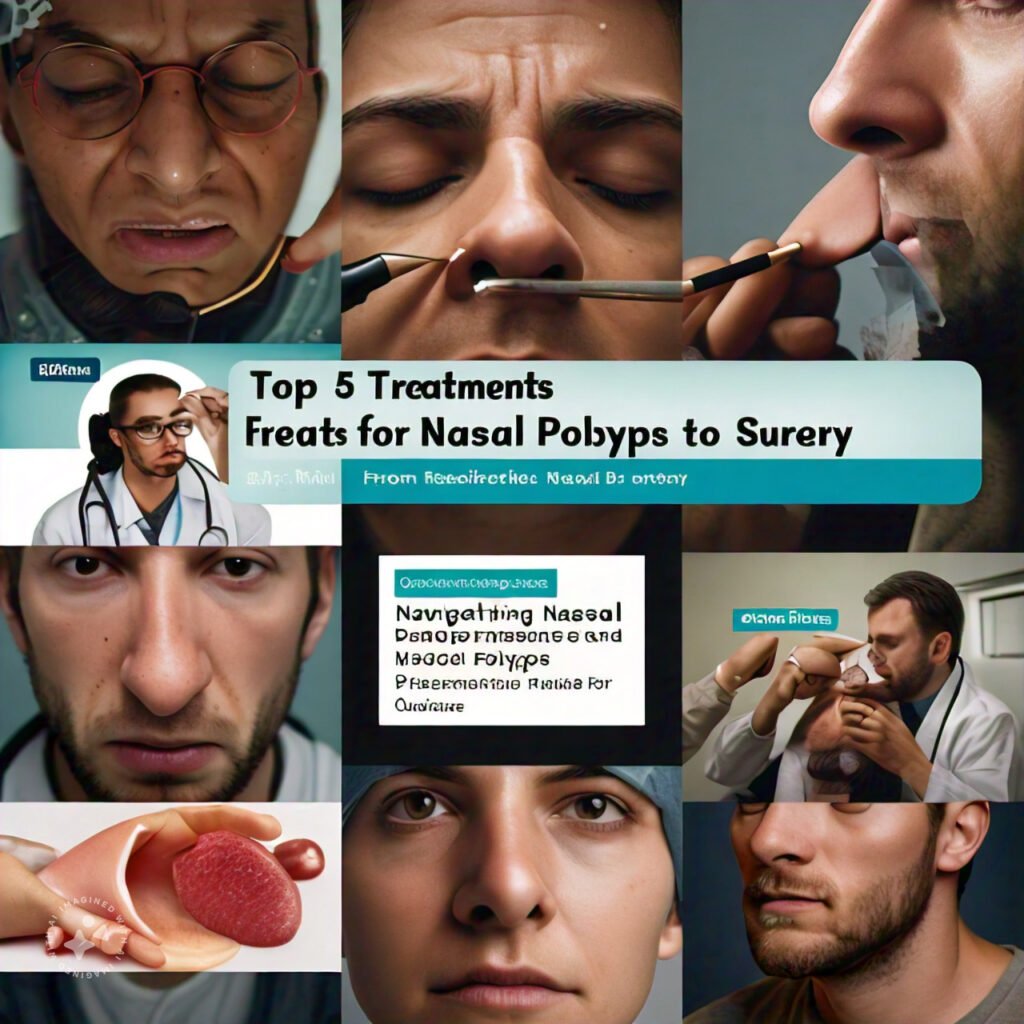
“10 Warning Indicators of Nasal Polyps”
“10 Warning Indicators of Nasal Polyps”
“Discover the top 10 warning signs of nasal polyps and learn how to manage them effectively. Get insights on symptoms, treatments, and preventive measures.”
Introduction

Here’s an image illustrating nasal polyps with explanations:
Explanations:
- Nasal Polyps: Non-cancerous growths in the nasal passages or sinuses.
- Location: Typically found in the lining of the nasal passages or sinuses.
- Symptoms: Can cause nasal congestion, runny nose, reduced sense of smell, and facial pain.
- Causes: Often associated with chronic inflammation due to allergies, asthma, or infections.
- Treatment: Includes medications, surgery, and home remedies to manage symptoms.
Brief Overview of Nasal Polyps
Definition and Description of Nasal Polyps Nasal polyps are non-cancerous growths that develop on the lining of your nasal passages or sinuses due to chronic inflammation. They can vary in size and may cause a range of symptoms depending on their size and location.
Common Causes and Risk Factors Nasal polyps are often associated with conditions that cause chronic inflammation in the nasal passages, such as:
- Allergies
- Asthma
- Recurring infections
- Certain immune disorders

Importance of Recognizing Warning Signs
Early Detection and Its Benefits Recognizing the warning signs of nasal polyps early can lead to timely medical intervention, which can prevent complications and improve quality of life. Early detection allows for more effective management of symptoms and reduces the risk of severe health issues.
Potential Complications if Left Untreated If nasal polyps are left untreated, they can lead to several complications, including:
- Chronic sinusitis
- Breathing difficulties
- Sleep disturbances
- Frequent sinus infections
By understanding and identifying the early warning signs, individuals can seek appropriate treatment and avoid these potential complications.
10 Warning Indicators of Nasal Polyps
- Persistent Nasal Congestion Persistent nasal congestion is a common symptom of nasal polyps. Unlike the congestion caused by a common cold, this type of congestion does not improve with typical over-the-counter medications and persists for a long time.
- Runny Nose or Postnasal Drip A continuous runny nose or postnasal drip, where mucus runs down the back of your throat, can be a sign of nasal polyps. This symptom is often accompanied by a feeling of mucus accumulation in the throat.
- Reduced Sense of Smell or Taste Nasal polyps can block the nasal passages, leading to a reduced sense of smell or taste. This can significantly impact your quality of life, making it difficult to enjoy food and detect odors.
- Facial Pain or Pressure Polyps can cause a feeling of pressure or pain in the face, particularly around the sinuses. This discomfort can be persistent and may worsen with changes in weather or altitude.
- Frequent Sinus Infections Recurrent sinus infections are a common indicator of nasal polyps. The polyps can block the sinuses, preventing proper drainage and leading to frequent infections.
- Snoring or Sleep Apnea Nasal polyps can obstruct the nasal passages, leading to snoring or sleep apnea. This can result in poor sleep quality and daytime fatigue.
- Headaches Chronic headaches, particularly those that are centered around the forehead and eyes, can be a symptom of nasal polyps. The pressure from the polyps can cause discomfort and pain.
- Itching Around the Eyes Itching around the eyes can be a sign of allergies, which are often associated with nasal polyps. This symptom can be accompanied by redness and swelling.
- Nosebleeds Frequent nosebleeds can occur due to the irritation and inflammation caused by nasal polyps. These nosebleeds are usually mild but can be persistent.
- Difficulty Breathing Through the Nose Nasal polyps can cause significant obstruction in the nasal passages, making it difficult to breathe through the nose. This can lead to mouth breathing and a dry mouth.

Healthy Diet for Nasal Polyps
Anti-inflammatory Foods Incorporating anti-inflammatory foods into your diet can help reduce inflammation and manage nasal polyps. Examples include turmeric, ginger, and garlic.
Foods Rich in Antioxidants Foods high in antioxidants can support your immune system and reduce inflammation. Berries, leafy greens, and nuts are excellent choices.
Hydration and Its Importance Staying hydrated is crucial for maintaining healthy mucous membranes. Drinking plenty of water can help keep your nasal passages moist and reduce irritation.
Foods to Avoid Certain foods can exacerbate inflammation and should be avoided. These include dairy products, processed foods, and sugary items.

Treatment Options
Medications Medications such as nasal corticosteroids and antihistamines can help reduce inflammation and shrink polyps. These are often the first line of treatment.
Surgical Options In cases where medications are not effective, surgical options like polypectomy or endoscopic sinus surgery may be considered to remove the polyps.
Home Remedies Home remedies such as nasal irrigation and steam inhalation can provide relief from symptoms and improve nasal passage clearance.

Precautionary Steps
Avoiding Allergens Identifying and avoiding allergens that trigger inflammation can help prevent the formation of nasal polyps. Common allergens include pollen, dust mites, and pet dander.
Maintaining Good Nasal Hygiene Regularly cleaning your nasal passages with saline solutions can help reduce inflammation and prevent the buildup of mucus.
Regular Check-ups with an ENT Specialist Regular visits to an ENT specialist can help monitor the condition and provide timely treatment to prevent complications.
FAQs
- What are nasal polyps? Nasal polyps are non-cancerous growths that develop on the lining of your nasal passages or sinuses due to chronic inflammation.
- How are nasal polyps diagnosed? Nasal polyps are diagnosed through a physical examination, nasal endoscopy, and imaging tests such as CT scans.
- Can nasal polyps be prevented? While it may not be possible to prevent nasal polyps entirely, managing allergies and avoiding irritants can reduce the risk.
- What are the treatment options for nasal polyps? Treatment options include medications, surgical removal, and home remedies to manage symptoms.
- Are nasal polyps cancerous? No, nasal polyps are benign and non-cancerous.
- How can diet affect nasal polyps? A healthy diet rich in anti-inflammatory foods and antioxidants can help manage inflammation and reduce symptoms.
- What are the risks of nasal polyp surgery? Risks include bleeding, infection, and recurrence of polyps.
- Can nasal polyps recur after treatment? Yes, nasal polyps can recur, especially if the underlying inflammation is not managed.
- How do nasal polyps affect breathing? Nasal polyps can obstruct the nasal passages, making it difficult to breathe through the nose.
- What lifestyle changes can help manage nasal polyps? Lifestyle changes such as avoiding allergens, maintaining good nasal hygiene, and following a healthy diet can help manage nasal polyps.



